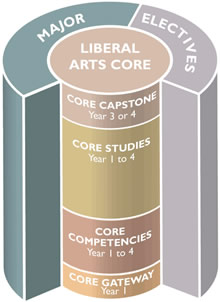After 15 years of the current core and nearly two years of discussions around core revision, three new core proposals, one of which is to retain the current core, will be brought to the faculty this May. Last week, faculty attended a town hall meeting designed to answer questions about the core proposals.
The Core Curriculum Committee had presented core revisions to faculty senate last spring, but senate sent it back to the committee for further revision.
The first model the committee presented this year proposes that a “one size fits all” core should be implemented regardless of the student’s program, professional or otherwise, giving the college the opportunity to decide what courses it deems non-negotiable in a Calvin education.
The second suggests that instead of beginning with the minimum and building up from that, all programs should start out with a larger core, which can then be adjusted to the professional programs through carefully planned out exemptions. This model would allow for more creative disciplinary and interdisciplinary course offerings within the core.
The differences between the two models mostly come down to religion courses and Developing a Christian Mind (DCM), as well as the number of course hours the committee believes core classes should be, such as whether the history core should be three or four credits.
At the town hall, the subject of DCM was discussed at length. One model proposed a change that would make DCM an upper level course instead of a first-year one, as well as combining some of the concepts that appear in DCM into the 100-level religion course required for core.
Some faculty argued that pushing back DCM would be beneficial, adding that by the time some first-year students are able to register, their first-choice DCM course are full, leaving them to study DCM material in a context that does not necessarily interest them.
Others, however, voiced concerns that pushing DCM to third or fourth year would rob students of the framework of seeing all faculty unified in what they believe and teach.
Another issue of concern at the town hall was core reductions, particularly in subjects such as history and social studies. One model proposed the substitution of a new “Global Citizenship” category that would combine the Global and Historical Studies (GHS), Foreign Language (FL) and Cross‐Cultural Engagement (CCE) categories; however, some thought this oversimplified diversity by portraying it as an international issue instead of a domestic one.
Professors, especially in the engineering department, feared the implications of an increased language core in the first model. They are concerned that it will deter incoming engineering first-year students from applying to Calvin because almost no colleges require a foreign language for engineering students.
Conversations concerning core revisions will continue throughout the semester, with a student town hall to be announced in the upcoming weeks.








